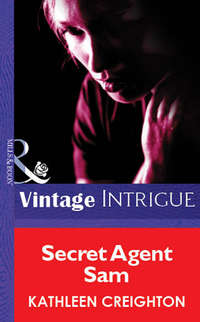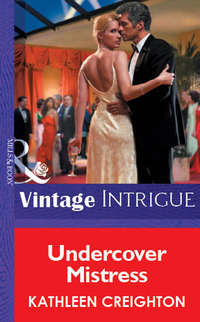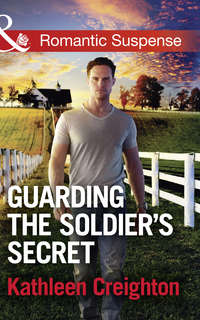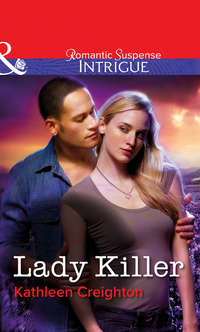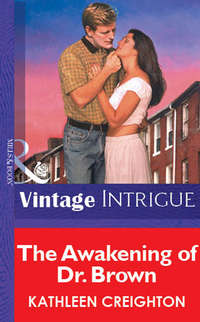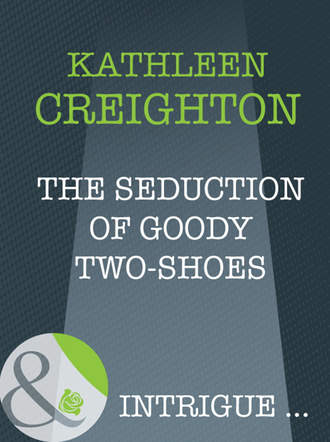
Полная версия
The Seduction Of Goody Two-Shoes
How was it, then, that in her first day on Mexican soil she’d already been involved in not one, but two incidents involving physical violence? And both times, if it hadn’t been for that American artist stepping in when he had….
Both times. She’d thought about that on the way back to the pier, thought about it as she walked beside the man—a stranger—through dark and empty streets, her adrenaline-charged brain worrying the notion like a starving wolf attacking a bone.
What is he doing there? Coming to my rescue—again? Can this be coincidence? Could he be one of them? Could he be the contact? If so, why doesn’t he say so? Why hasn’t he identified himself, or at least slipped me something with the meeting information on it?
All the way back to the pier, on the alert and aware of his body so close beside hers, remembering the wiry strength in his hands when they’d gripped her arms, she’d waited for him to make his move. He hadn’t. In the end she’d felt foolish, out of her depth, questioning her own judgment. Of course he wasn’t involved. He was exactly what he appeared to be—an American artist and social dropout trying to make a living hustling tourists. His being there to rescue her twice in one day was just coincidence. Those things happened.
Besides, according to all the information so far, the smugglers were Mexican—back-country Mexican, as Ken put it. Old-fashioned Macho Mexican Males who wouldn’t lower themselves to deal with a woman.
That was fine. But people in law enforcement are taught to distrust coincidence as a matter of principle. And there were those paintings. Parrots. Macaws. Tropical birds of all kinds, many of them the very same ones that so often turned up dead in customs inspections. Gaudy and Godawful Mr. McCall’s paintings might be, but there was no denying he had the details right.
Still the question remained: If the American was a member of the smuggling ring, why hadn’t he established contact with her?
She was still pondering those questions as she stood before the door to her stateroom, key in hand, frowning and gnawing on her lip as was her habit when deep in thought. Consequently she didn’t notice the white-uniformed ship’s steward hurrying toward her down the long passageway, not until he spoke to her with alarming and breathless urgency.
“Mrs. Burnside—Mrs. Burnside, thank God you’re back. We’ve been trying to reach you….”
A few tense and worried minutes later she was shown into a small cluttered office where two men were already engaged in grave consultation. They both straightened at Ellie’s entrance to murmur, “Come in, Mrs. Burnside.” One, a dark-skinned, salt-and-pepper-haired man with kind, liquid eyes, shook her hand and identified himself as the ship’s physician, Dr. Singh; the other, judging by his frown and the resplendence of his uniform, she took to be the captain.
The fear that had clutched Ellie’s stomach with the steward’s first breathless words outside her stateroom squeezed even tighter. Even though Burnside wasn’t really her husband, and there were times, in fact, when he annoyed her beyond bearing, he was still her partner, mentor and even, in an odd sort of way, a friend.
She gasped out, before anyone else could say a word, “Ken—my husband—is he all right? What’s happened? Is he—he’s not—”
The doctor’s tone was stern, even though his voice was limpid with the accent of his native India. “It is very fortunate that he called us when he did, Mrs. Burnside. If he had waited even one more hour…. You should have come to us when his symptoms first occurred. As it is—”
“He had an upset stomach,” Ellie cried, defensive in the face of the two men’s unspoken disapproval, though she wasn’t quite sure what she was supposed to be guilty of. “He said—he insisted it was just a twenty-four-hour bug!” She carefully made no mention of food poisoning; apparently her stock with ship’s personnel was plummeting as it was. “I asked him—” She paused to draw a shaky breath, one hand pressed to her forehead. After a moment she said testily, fighting for calm, “So—what’s wrong with him? Where is he? I want to see him.”
“He has acute appendicitis,” the doctor said gravely. After a polite pause for Ellie’s horrified gasp, he continued, “At this moment he is on his way by helicoptor to the airport at Cozumel. From there he will be flown to Miami for immediate surgery.”
Ellie was groping for a chair. The captain unfolded his arms from across his chest long enough to guide her to one. “We will, of course, make arrangements for you to join him as soon as possible,” he said politely as she sank into the chair, limp with shock. Oh, what she would have given for a Hershey’s Kiss just then.
The censure in the captain’s voice and expression seemed to have softened somewhat at this evidence of appropriate wifely concern, but his opinion was no longer of any concern at all to Ellie. Having been reassured that her partner was alive and in good hands, what concerned her now was the fate of their undercover operation. This, after all, was the mission, the goal, the crusade she’d dedicated her life to for over a year—dedicated being the operative word and one people often used to describe Ellie Lanagan…although members of her immediate family would probably have been more inclined to say pig-headed, or stubborn as a mule. This also was no concern of Ellie’s; it was just the way she was, the way she’d always been. When Ellie got involved in something she tended to develop tunnel vision, or what Ken referred to as a “pit-bull mentality.”
Now, thinking hard and once again frowning and chewing on her lip, she muttered, “No…no…I can’t. I can’t leave now—”
Well, tough, was her annoyed thought when she saw the captain’s face freeze up again. Even the doctor looked slightly taken aback. But Ellie’s mind was starting to function, although still in the crazily spinning, drunken wobble of an out-of-balance top.
“You don’t understand,” she went on. “We—my husband and I—had some business here. It was very important.” The wobble had sneaked into her voice now, and for once to her advantage. She cast an appealing look from one disapproving face to the other and back again. “That’s why he didn’t want to believe there was anything seriously wrong. He was convinced it was just an upset stomach. He convinced me….” She gulped a breath and pushed resolutely to her feet. “I know he’d want me to stay and try to take care of…our business…for him. I don’t know if I can, by myself, but…I have to try. And,” she added with a touch of asperity, “there’s not really anything I can do for him there, is there? In Miami I mean? Except wait?”
She looked at Dr. Singh, who was looking slightly dazed. He nodded and murmured, “Of course. I understand….”
The captain cleared his throat and finally growled an ambiguous, “Well.” He coughed, then continued, “As you know, we’ll be staying in port for several days to allow our passengers an opportunity to explore the Mayan ruins, visit the biosphere reserve, or dive the reefs, if that’s their preference. You have until day after tomorrow, seventeen hundred hours, to let us know whether or not you’ll be continuing on with us.” He paused with one hand on the door. “Or, whether you wish us to make arrangements for you to join your husband.” He opened the door and waited for Ellie to precede him. “It’s up to you.”
“Thank you.” She was looking past the captain’s out-stretched arm at the doctor. “You’ll let me know…how—”
“Yes, of course, Mrs. Burnside,” said Dr. Singh with a slight bow. “As soon as I know anything I will contact you immediately.”
Ellie nodded and turned to go, then, spotting the steward hovering just outside the door, halted once more to ask whether there had been any messages for her, or rather, for her “husband.”
While the captain took his leave with poorly concealed impatience, the steward promised to check for messages as soon as he’d seen her back to her stateroom.
That turned out not to be necessary. When Ellie unlocked her stateroom door she found an envelope lying on the carpet, where it had apparently been slipped under the door.
“Well, there you are,” the steward said, showing friendly white teeth. “Must have just come in.” He hovered while Ellie tore open the envelope and read the brief handwritten message inside. “Is that the message you were expecting, Miss, uh…ma’am?”
“Mmm…” she murmured absently. “Yes…I think so. Thank you…” For a moment longer the steward hovered, then shrugged and went out, closing the door behind him. Belatedly, the word tip flashed into Ellie’s mind. But only fleetingly; she had more important things on her mind.
Mañana—twelve o’clock noon. Take a taxi from the plaza. Give driver this following instruction….
Noon. Tomorrow.
Ellie’s knees suddenly went weak, and she sank onto her smooth undisturbed bed, reaching automatically for the bag of Kisses. A few feet away, tumbled sheets dragged half onto the floor bore mute testimony to the disaster that had befallen her—or more accurately, her partner.
Her partner. Wait a minute. Ken was the one with appendicitis. There was nothing whatsoever wrong with her.
Heart thumping, even chocolate momentarily forgotten, she stared down at the piece of paper in her hands. Tomorrow noon. Okay. This was it. The meeting they’d been working toward, hoping for, for months. Okay, so Ken was out of the picture, but she was still here. There was nothing wrong with her. Why couldn’t she still go through with it? Why shouldn’t she?
Okay, Ellie, think about this logically.
On the downside, according to Ken these smugglers were a backward lot, with some annoyingly primitive ideas about women. He’d said they probably wouldn’t even do business with a woman alone. Probably.
All right, so what? At the worst they wouldn’t do business with her—a little humiliating, maybe, but she could handle that. And at least she would have a chance to explain what had happened, perhaps try to postpone the meeting until Ken was back in action.
But what if that wasn’t the worst?
Memories of the evening’s incident at José’s Cantina crowded fresh and vivid into her mind, complete with the residuals of sour breath and hot, unwashed bodies. Reluctantly, she thought about the number one rule in law enforcement: never go into anything without backup.
Tonight she’d had backup—unplanned, but backup nonetheless. She forced herself to consider what would have happened if that artist hadn’t arrived when he had. Probably nothing—she really did believe she could have handled those two drunks without any help. But that was just it—the men who’d accosted her had been a couple of relatively harmless neighborhood punks, and drunk to boot. The smugglers, she was certain, would be a different breed entirely.
But if she didn’t keep the rendezvous, what then? How many months would it take to win back the smugglers’ trust and set up another meeting? And in the meantime, how many hundreds, even thousands, of rare and beautiful animals would die in horrible, cruel ways? As always, that thought made Ellie’s stomach clench and her skin go clammy.
She jumped up and began to pace—to the extent such an activity was possible in the cramped stateroom.
I should at least contact General Reyes, she thought, nibbling furiously at her lip. General Cristobal Reyes was the head of the Mexican government agency that had been working in close partnership with the USFWS and the man in charge of the Mexican phase of the operation. Though she’d never actually met him, he was, in effect, at this juncture, anyway, her boss. He would have to be told about this latest development. Of course he would.
And the general would call off the operation, or at least postpone it until Ken was back in action. He would tell her in no uncertain terms not to go to this meeting alone. Of course he would.
What shall I do? Think, Ellie, think! Use your wits….
It was the word wits that made her stop pacing and begin instead to smile. Keep your wits about you. It had always been one of her mother’s favorite sayings, and Ellie could hear Lucy’s stern and scratchy voice as clearly as if she’d been standing there beside her. Keep your wits about you, Rose Ellen Lanagan.
A sweet and childish longing swept over her as she sank onto the bed, popped a Kiss into her mouth and reached for the telephone.
Ordinarily Lucy found October’s lull a welcome respite after the busy rush of September and its jam-packed schedule of back-to-school, 4-H meetings, fairs and livestock sales. For a little while, between harvest and the hardships of winter, she could spend time with Mike, or simply relax and enjoy the cool, crisp mornings and bright, golden noontimes—as much as Lucy had it in her nature to relax.
Oh, but she did like the lovely sense of satisfaction that came with having once again, against all the odds man and nature could throw at her, successfully brought in a decent harvest. And though she always felt a small twinge of regret at the first soft furring of frost on the corn stubble, she never failed to feel her spirits lift when she heard the distant honking of migrating geese and paused, shading her eyes against the glare, to watch the fluid arrows dipping and floating through a crystal-clear autumn sky.
Infused with restless energy, she spent those days cleaning the house, raking leaves, or, something she’d always enjoyed much more, working in the barn, piling the stalls full of sweet-smelling straw and declaring all-out war on the summer’s accumulation of spiders.
Her husband Mike, the journalist, attributed all this activity to a primitive, instinctive fear of winter, the same instinct, he said, that prompts squirrels to run about gathering nuts.
Well, of course, Mike was a writer, and Lucy was used to his tendency to over-verbalize—not to mention dramatize. She certainly was not afraid of winter, or anything else, for that matter. Except maybe thunderstorms, which she considered only basic good sense; as far as Lucy was concerned, thunderstorms were violent, dangerous and destructive, and anybody with half a brain ought to be afraid of them. And as far as instinct went, why, it seemed only natural that someone who’d spent her whole life on a farm would be more sensitive than some people to the rhythms of nature…the turn of the seasons…the cycles of life and death.
For everything there is a season, and a time to every purpose under Heaven…. That had been one of Aunt Gwen’s favorite passages of scripture and she’d quoted it often and taken comfort from it. So had Lucy.
But this year, for some reason, she acknowledged a certain…sadness at the turning of the seasons. Perhaps it was partly because Gwen was no longer here to share them with her, but this year the autumn evenings seemed longer to her than usual, the big old farmhouse emptier, the silence…lonelier.
When the phone rang that particular evening, Lucy was curled up on the couch in what had once been, and what Lucy still considered to be, Aunt Gwen’s parlor.
Earlier she and Mike had eaten supper together off trays while watching the CBS Evening News and Jeopardy. Then, while Lucy clicked irritably through the channels looking for her favorite shows, which seemed to be all out of place since the start of the new TV season, Mike had returned to work on his weekly column for Newsweek magazine.
He’d moved his computer into the parlor after Gwen’s death the previous year, since it was cooler there than any of the spare bedrooms upstairs. In the summer it was a dim and peaceful working place, with dappled shade from the big old oaks that grew on that side of the house. In the fall, afternoon sunlight diffused through autumn’s leaves filled the room with a lovely golden warmth, and in winter, the last of each day’s meager ration of sunshine found its way between the filigree of bare branches. It had always been Lucy’s favorite room, with the upright piano and its collection of family photographs on top, the white-painted mantelpiece covered with still more photos, the shelves full of books. And of course, Gwen’s ancient recliner, empty now this past year, and yet…sometimes Lucy swore she could still feel Gwen in that room, and hear the musical grace note of her laughter.
The telephone’s polite trill made Lucy jump; calls late in the evening weren’t all that common in rural Iowa, and seldom meant good news. As she reached for the cordless that had replaced the old kitchen wall phone a few years back, Mike stopped typing and peered at her expectantly, blind as a mole in his special computer glasses, the dark-rimmed ones that give him a distinctly Harry Potter look.
“Mom?”
Lucy came bolt upright on the couch. “Ellie? Well, for goodness’ sake!” Her mom-radar was lighting up like a Christmas tree. Across the room, Mike took off his Harry Potter glasses. “What’s wrong?”
“Nothing’s wrong, Mom, just called to say hi.”
Lucy was unconvinced. “Your voice sounds funny.”
“Probably because I’m eating chocolate. Plus, I’m on a cell phone. Mom, I’m fine, really.”
“A cell phone!” Lucy was just getting used to cordless. “Well, you sound like you’re a million miles away.”
“Not quite—I’m in Mexico. On a ship. Listen, Mom—”
“Oh Lord. Not that Save the Whales stuff again? I thought you were through with—”
“It’s not that kind of ship. Mom, listen—I need some advice.”
“Advice!” Once again Lucy jerked as if she’d been poked. Across the room, Mike’s eyebrows had shot up. As they both knew, Rose Ellen, being her mother’s daughter, had never been one to take, much less seek, anyone’s advice. “From me? Are you sure you wouldn’t rather ask your dad? He’s right here.”
“Hey—give him a big hug and a kiss for me.” Ellie’s voice sounded odd again—slightly muffled, which Lucy knew meant she probably had her mouth full of chocolate. Which made her radar light up even more; Ellie always turned to chocolate in times of stress.
“Mom—I need to ask you something. I haven’t got a lot of time…. There’s something I need to do—at least, it’s something I believe I should do—I think other people would probably tell me I shouldn’t do it—they might even tell me absolutely not to do it, and then I’d have to do it anyway, and probably—”
“Ellie—slow down. You’re not making sense. What is this thing you think you have to do?”
There was a pause, and then, “I can’t really tell you that, Mom.”
“I see. Is it dangerous?” Lucy’s voice cracked on the last word. She cleared her throat while Mike pushed back his chair.
After an even longer pause, Ellie said, in the voice nearly everyone said was very like her mother’s, “I think maybe…it could be, yes.”
Lucy sat very still. Mike came to sit beside her, dipping the cushions so that she had to lean back against him. But she straightened herself and said very quietly, “Rose Ellen, you have a good level head on your shoulders. I know you wouldn’t do anything foolhardy.”
“No, Mama.” Now she sounded like she had as a little girl, angelically, breathlessly protesting her innocence. Ellie never had been able to lie convincingly.
Lucy said, in what Mike always called her rusty-nail voice, “But, I know how you are when you really believe in something. If there’s something you think you have to do….” She felt Mike’s arms come around her and hurriedly cleared her throat as she gripped the phone hard. As if she could somehow force her strength of will and passion through those nonexistent wires. “Listen…honey—you just have to trust yourself. We’ve taught you to use your head and think for yourself, so you use your own judgment—your own good judgment, no one else’s. You do what you have to do, honey. But you keep a level head, now, you hear me? You keep your wits about you.”
“Yes, Mama. Thanks…I love you.” Ellie was laughing…wasn’t she? “Mom—tell Dad I love him, too, okay? Hey, listen, I’m sure it’ll be okay. So don’t worry about me, okay? I’ll call you later and tell you all about it.”
“Ellie, wait—”
“Bye Mom, bye, Dad. Don’t worry.”
“Wait—” But the line had gone dead. Lucy punched the disconnect button and swiped angrily at her cheeks. “Damn,” she rasped, “I didn’t even get to tell her the news about Ethan getting married. You know he was always her favorite cousin.”
Mike cleared his throat as he pulled her back against him. “Probably not a good idea, if she was on a wireless phone.”
Lucy sniffed. “You think?”
“Not unless you want to read all about it in tomorrow’s headlines: President’s Son to Wed Notorious Rock Star!”
Lucy laughed…and sniffed again. Mike’s arms tightened and he kissed the top of her head. “Hey, love, why’re you crying? Ellie’ll be fine—like you said, she’s got a good head on her shoulders.”
Lucy burrowed her face against the chest of the only person in the world who was allowed to see her cry. “Our children are so far away, Mike. Rose Ellen off on some ship, and Lord only knows where Eric is—it’s been months since he’s called.”
“A little delayed empty-nest syndrome, love?” Mike said softly, holding her close. “It’s been quite a few years since our kids flew the coop.”
“Yes,” Lucy gulped, “but I think it just hit me that they’re not coming back.”
Chapter 3
McCall was packing it in early. Business had been slow all morning, which was more or less normal for the day after a cruise ship dropped anchor. Today was everybody’s day to be off in the jungle swatting mosquitos and climbing pyramids or bird-watching in the biosphere reserves, or, for the younger and more athletically inclined, diving the wrecks and reefs offshore. Tomorrow there’d be another big flurry of shopping just before the ship set sail, everybody stocking up on trinkets and souvenirs to take home, put away in a drawer somewhere and eventually forget all about. But right now the heat and tropical-storm humidity were settling in and siesta time was coming on. He figured he’d just as well call it a day.
He was working up a sweat in the late October heat, trying to wedge the last of his canvasses into his ancient faded blue Volkswagen when he heard a sound that made his blood run cold.
“Taxi? Excuse me, señor…por favor, is this, uh…¿este…esta un taxi?”
There was no mistaking that raggedy voice.
Sure enough, across the street at the taxi stand near the entrance to the plaza, the cinnamon girl was attempting to rouse the driver of the lone cab parked there from his noonday siesta.
Oh Lord, McCall thought, what’s she up to now?
But as much as he tried, he couldn’t keep himself from stopping what he was doing to watch her. It didn’t help that she was wearing a bright yellow tank top with one of those wraparound things that can’t decide whether to be shorts or a skirt, this one in a loud Hawaiian print—hibiscus blossoms and palm fronds in clear shades of red, green and yellow—something like his own paintings, in fact, only a lot prettier. It would probably have hit her a couple inches above the knee if she’d been standing up straight, but since she was bending over to talk to the cab driver through his open window, McCall’s view of her legs was extended considerably, and most pleasingly. All in all, she looked like a walking ad for some kind of tropical suntan lotion, and yummy enough to make a man’s mouth water.
Except for the big clunky running shoes and the dorky-looking hot-pink sunshade on her head, anyway. McCall couldn’t understand why so many tourists wore those sun visor things; he’d never seen a woman yet who looked good in one. Though Cinnamon Girl came close.
Those thoughts were distracting enough that it took him a moment to realize that she was having some trouble making the taxi driver understand where she wanted to go. It looked like she’d given him a piece of paper with the address written on it, but in spite of that the driver kept shaking his head and gesturing in a decidedly negative fashion. Even from where he stood McCall was getting his message loud and clear: Lady, you are loco!
In her exasperation, Cinnamon Girl snatched back the paper and read what was on it in a loud voice, the way people do, for some reason, when they try to communicate in a foreign language—as if they think deafness is the root of the problem. When she did that, her words carried clearly to McCall’s ears, and what he heard made him swear out loud.



